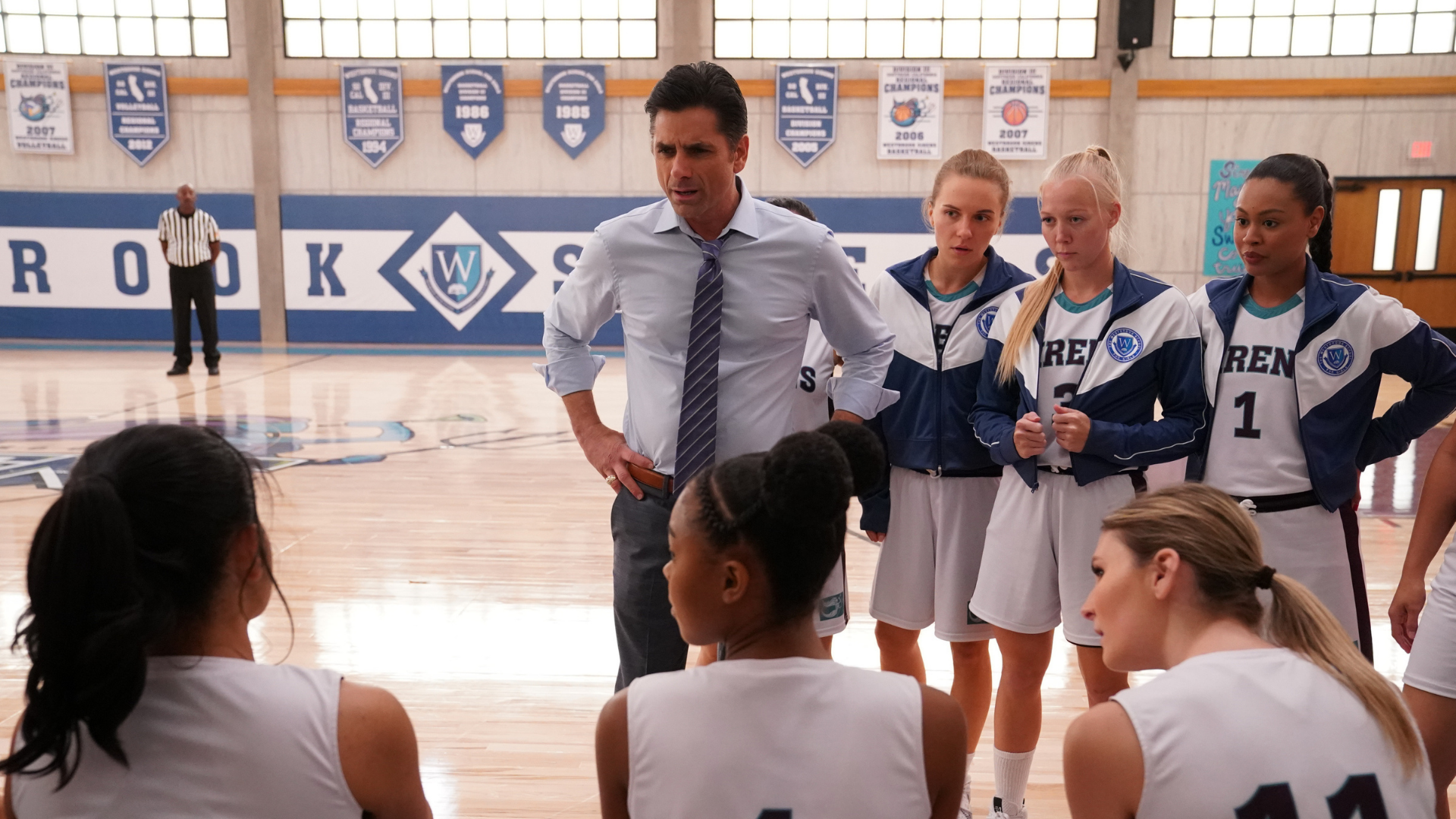
There’s a growing number of fictional sports coaches on TV who reinvent their brusque training methods and personalities when paired with an unlikely team. Whether it’s Johnny Lawrence teaching kids karate in Cobra Kai or Sam Sylvia’s ragtag women wrestlers in GLOW, these coaches gradually connect with players they didn’t want in the first place, softening their attitude about life in the process. You can add the new Disney+ drama Big Shot to this roster, along with The Mighty Ducks: Game Changers. The sports dramedy from Brad Garrett, David E. Kelley, and Dean Lorey sees recently fired NCAA coach Marvyn Korn (John Stamos) reluctantly team up with the burgeoning young basketball players of a private all-girls high school. As he bonds with them, Marvyn inevitably sheds his prickly nature to step more into the molds of big-hearted, inspiring characters like Friday Night Lights’ Eric Taylor and Ted Lasso.
The series’ lead star and its attempt to tell heartwarming stories help to keep the momentum going even as it goes down a predictable path. The premiere quickly sets up its premise: Marvyn’s anger issues cause him to lose a long-running gig as one of the most winning active men’s college basketball coaches. He has no choice but to accept the only job he can get, so he sets up shop at the elite Westbrook High School outside of San Diego. He can’t afford to be his usual blunt self with his new set of players, because they’re teenage girls. As he adjusts and grows to mentor them, Marvyn taps into the more human side of himself that got lost in the shuffle as he focused on his basketball career.
Big Shot is all about Marvyn’s redemption, but that arc isn’t a strong or distinctive enough hook to carry the show forward. The unwavering belief that he can transform and “grow into the person he’s always hoped to be,” as the official synopsis says,” by connecting with these teenage basketball players without actually working on himself actually undermines his growth. Marvyn’s abrasiveness eases up as the season continues, which mitigates any potential discomfort about the story of a middle-aged man yelling at high schoolers because he is, in part, upset about having to coach high schoolers.
And, despite being set in a high school, there isn’t as much focus on the teen players as there should be. Their storylines are mostly in service of Marvyn’s. Louise Gruzinsky (Nell Verlaque), a proficient shooting guard who is trying to escape her father’s crushing demands, and Destiny Winters (Tiana Le), with whom Marvyn starts off on the wrong foot—he asks her to shed five pounds—end up forming a mentor/mentee bond with him. Though all the teammates are friendly and don’t get mired in rote “boy trouble” storylines, the performers aren’t given the space they need to shine. Even Marvyn’s daughter Emma (Sophia Mitri Schloss) primarily exists to ask him to reflect on whether he’s being true to himself. Another lapse in judgment is the sporadic use of Yvette Nicole Brown, who plays Westbrook’s dean Sherilyn Thomas. She is mainly present to babysit Marvyn, when Brown’s talent could be used for meatier, funnier scenes.
If Big Shot is able to find its footing, it’s thanks to Stamos. He renders a believable performance—Marvyn’s discomfort at this major life change eventually transforms into subtle acceptance and joy. The actor can pull off comedy, as witnessed in his early years on Full House and the more oddball humor of Grandfathered and Scream Queens—but here he shows off his more dramatic side. The role isn’t as hard-hitting as Marc Maron’s Sam Sylvia, but Stamos brings warmth to his role, sometimes slipping into the comfortable Uncle Jesse mode to better suit the wholesome ethos and target audience of Disney+’s teen offerings. Marvyn’s prickly exterior also finds an effective counterbalance in Holly Barrett (Jessalyn Gilsig), his down-to-earth assistant coach, as the two strike an improbable friendship.
The conventional narratives of the show find a way to be engaging by earnestly building on Marvyn’s newly formed relationships. He doesn’t instantly get along with the girls on his team, but he eventually gains their trust through motivational speeches, actually helping out their game, becoming a paternal figure of sorts, as well as a considerable amount of help from Holly. Most of the young players refuse to tolerate Marvyn’s insults or attitude, as witnessed in how Destiny stands up for herself after he casually asks her to lose weight. Big Shot needs more such effective moments, so it features not only Marvyn’s growth, but also shows how the girls are finding their voice and independence. The show needs to be more of a team effort, on and off the court.